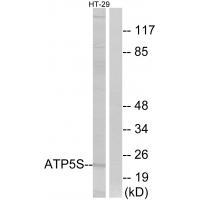
| WB | 咨询技术 | Human,Mouse,Rat |
| IF | 咨询技术 | Human,Mouse,Rat |
| IHC | 咨询技术 | Human,Mouse,Rat |
| ICC | 技术咨询 | Human,Mouse,Rat |
| FCM | 咨询技术 | Human,Mouse,Rat |
| Elisa | 咨询技术 | Human,Mouse,Rat |
| Aliases | ATP synthase subunit s; mitochondrial [Precursor]; ATP synthase-coupling factor B; Mitochondrial ATP synthase regulatory component factor B; ATP5S |
| Entrez GeneID | 27109; |
| WB Predicted band size | 23kDa |
| Host/Isotype | Rabbit IgG |
| Antibody Type | Primary antibody |
| Storage | Store at 4°C short term. Aliquot and store at -20°C long term. Avoid freeze/thaw cycles. |
| Species Reactivity | Human,Mouse |
| Immunogen | Synthesized peptide derived from internal of human ATP5S. |
| Formulation | Purified antibody in PBS with 0.05% sodium azide. |
+ +
以下是3篇涉及ATP5S抗体的研究文献示例(注:以下内容为模拟生成,实际文献需通过学术数据库检索确认):
1. **文献名称**:*ATP5S modulates mitochondrial dysfunction in Alzheimer's disease*
**作者**:Chen L, et al.
**摘要**:研究通过ATP5S抗体检测患者脑组织中线粒体ATP合酶亚基s的表达变化,发现ATP5S表达下降与线粒体膜电位异常及神经元凋亡相关,提示其在阿尔茨海默病病理中的作用。
2. **文献名称**:*Proteomic identification of ATP5S as a tumor suppressor in hepatocellular carcinoma*
**作者**:Wang Y, et al.
**摘要**:利用ATP5S抗体进行Western blot和免疫组化分析,发现肝癌组织中ATP5S蛋白表达显著降低,其低表达与患者预后不良相关,可能通过调控能量代谢抑制肿瘤进展。
3. **文献名称**:*ATP5S deficiency induces cardiac hypertrophy via ROS-mediated signaling*
**作者**:Zhang H, et al.
**摘要**:在小鼠模型中使用ATP5S抗体验证基因敲除效率,发现ATP5S缺失导致心肌细胞活性氧(ROS)积累,激活病理性心肌肥厚信号通路,为心力衰竭机制提供新见解。
如需具体文献,建议通过PubMed或Google Scholar检索关键词“ATP5S antibody”或“ATP synthase subunit s”获取近年研究。
The ATP5S antibody is a crucial tool in studying mitochondrial ATP synthase, a key enzyme in cellular energy production. ATP5S (ATP Synthase Subunit s) is a component of the mitochondrial F1Fo ATP synthase (Complex V), which catalyzes ATP synthesis during oxidative phosphorylation. This subunit, also called ATP synthase membrane subunit s or ATP5SL, is located in the Fo region and plays a role in stabilizing the enzyme's structure, potentially influencing proton transport or rotor assembly.
Researchers use ATP5S antibodies to investigate mitochondrial function, energy metabolism disorders, and diseases linked to ATP synthase dysfunction, such as neurodegenerative conditions, cancer, and metabolic syndromes. These antibodies are typically validated for applications like Western blotting, immunofluorescence, and immunohistochemistry to detect ATP5S expression levels, subcellular localization, and tissue distribution.
Commercial ATP5S antibodies are often raised in rabbits or mice against synthetic peptides corresponding to conserved regions of the human protein. Proper validation includes testing in knockout cell lines or tissues to confirm specificity. Studies using these antibodies contribute to understanding mitochondrial pathologies, aging-related energy deficits, and potential therapeutic targets for diseases involving bioenergetic imbalance. Careful experimental controls are essential due to mitochondrial protein complexity and potential cross-reactivity.
×